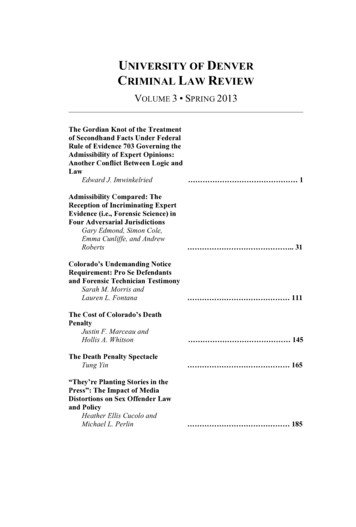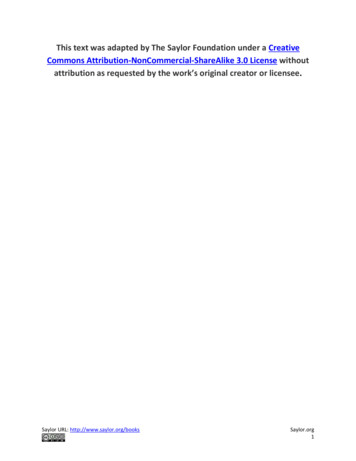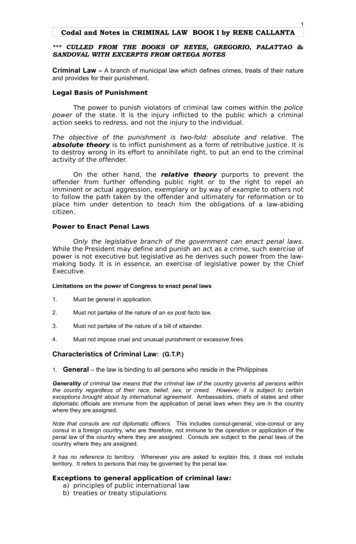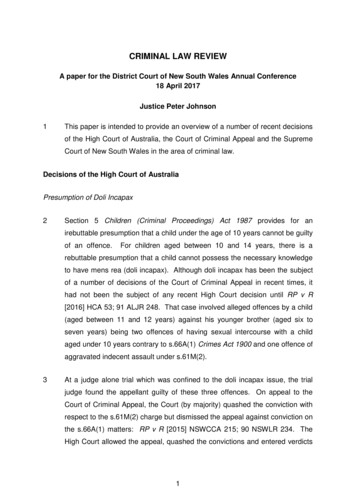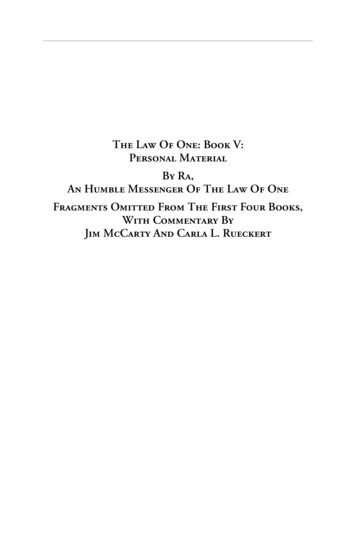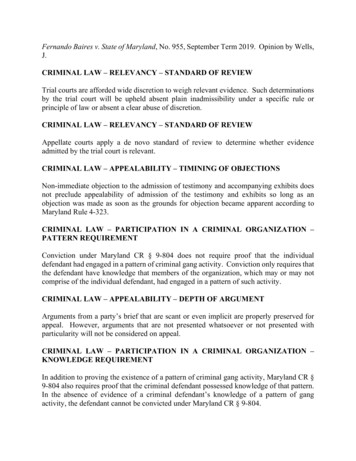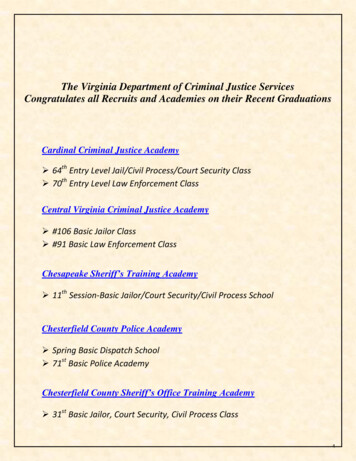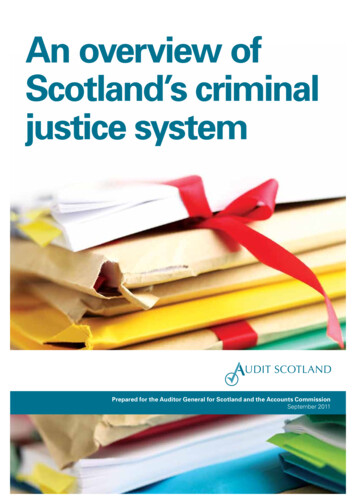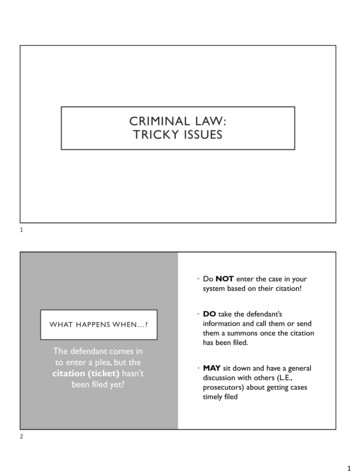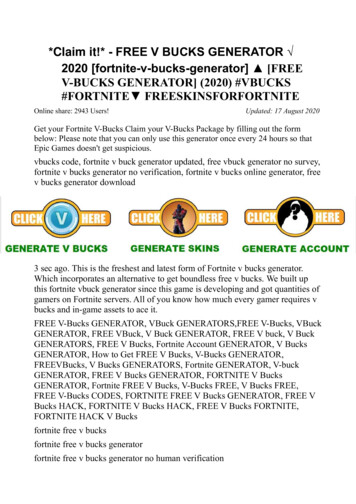
Transcription
Criminal Procedure:A Free Law School CasebookBen TrachtenbergIsidor Loeb Professor of LawUniversity of Missouri School of LawAnne AlexanderAssociate Teaching Professor of Law andDirector of Legal Research & WritingUniversity of Missouri School of LawCALI eLangdell Press 2020
DedicationWe dedicate this book to our students, our colleagues, and our families, as well as to allwho support the mission of America’s public law schools.AcknowledgementsFrom Ben TrachtenbergFirst and foremost, I thank Joanna Trachtenberg for marrying me, agreeing to move withme to Missouri, and being a far better spouse than I could possibly deserve. I also thankAkiva and Shoshana Trachtenberg, who remind me of the importance of justice to theworld.I thank Anne Alexander for agreeing to join this project, which I began somewhatimpulsively and could never have completed (at least not well and on time) without herassistance.From Anne AlexanderI am most thankful to my husband Marc, whose support and love keeps me grounded ina way that helps me accomplish my dreams. I also thank our twin daughters, Lilly andSydney Alexander; their perseverance and search for equality motivate me to ask the hardquestions.Thanks also goes to Ben Trachtenberg, who is a good friend and colleague. May hispenchant for pushing me into different projects continue to lead to great unforeseenadventures in our academic careers.From Ben Trachtenberg & Anne AlexanderWe thank the University of Missouri System’s Affordable & Open Educational Resourcesinitiative and the UM System’s Diversity Equity and Inclusion inclusive teachingincentive, both of which provided funding to support the first edition of this book.We also thank MU law student research assistants Callie Haslag, who provided supportthrough the Shook, Hardy & Bacon research assistant program, and Samuel Thomas.The authors give special thanks to research assistant Aaron Wynhausen, who joined thisproject early in the fall 2018 semester and proofread most of the chapters in the firstedition, often under time pressure.We also thank The Center for Computer-Assisted Legal Instruction (CALI) for publishingthe current edition. In particular, Deb Quentel has provided important support.Preliminary Material – Page 1
Date & EditionThe first edition of this book was compiled and released for the fall semester of 2018, andthe book was used again during the spring 2019 semester. With a brief supplement (andno significant revisions), the book was republished for 2019-2020.This edition is substantially revised and is being released for use during the 2020-2021year and beyond. Page numbers in this edition will not match those of previous versions.Preliminary Material – Page 2
NoticesThis is the first eLangdell Press edition of this casebook, published July 2020. Visithttps://elangdell.cali.org/ for the latest version and for revision history.This work by Ben Trachtenberg and Anne Alexander is licensed and published by CALIeLangdell Press under a Creative Commons Attribution-NonCommercial-ShareAlike 4.0International (CC BY-NC-SA 4.0). CALI and CALI eLangdell Press reserve undercopyright all rights not expressly granted by this Creative Commons license. CALI andCALI eLangdell Press do not assert copyright in US Government works or other publicdomain material included herein. Permissions beyond the scope of this license may beavailable through feedback@cali.org.In brief, the terms of that license are that you may copy, distribute, and display this work,or make derivative works, so long as you give CALI eLangdell Press and the author credit; you do not use this work for commercial purposes; and you distribute any works derived from this one under the same licensing terms asthis.Suggested attribution format for original work:Ben Trachtenberg and Anne Alexander, Criminal Procedure: A Free Law SchoolCasebook, Published by CALI eLangdell Press, 2020. Available under a CreativeCommons BY-NC-SA 4.0 License. tenberg-alexanderCALI and eLangdell are United States federally registered trademarks owned by theCenter for Computer-Assisted Legal Instruction. The cover art design is a copyrightedwork of CALI, all rights reserved. The CALI graphical logo is a trademark and may not beused without permission.Should you create derivative works based on the text of this book or other CreativeCommons materials therein, you may use this book’s cover art and the aforementionedlogos, however, use does not imply endorsement by CALI.This material does not contain nor is intended to be legal advice. Users seeking legaladvice should consult with a licensed attorney in their jurisdiction. The editors haveendeavored to provide complete and accurate information in this book. However, CALIdoes not warrant that the information provided is complete and accurate. CALI disclaimsall liability to any person for any loss caused by errors or omissions in this collection ofinformation.Preliminary Material – Page 3
About CALI eLangdell PressThe Center for Computer-Assisted Legal Instruction (CALI ) is: a nonprofit organizationwith over 200 member US law schools, an innovative force pushing legal educationtoward change for the better. There are benefits to CALI membership for your school,firm, or organization. ELangdell is our electronic press with a mission to publish moreopen books for legal education.How do we define "open?" Compatibility with devices like smartphones, tablets, and e-readers; as well asprint. The right for educators to remix the materials through more lenient copyrightpolicies. The ability for educators and students to adopt the materials for free.Find available and upcoming eLangdell titles at https://www.cali.org/the-elangdellbookstore. Show support for CALI by following us on Facebook and Twitter- @caliorg –and by telling your friends and colleagues where you received your free book.Preliminary Material – Page 4
About the AuthorsBen Trachtenberg is the Isidor Loeb Professor of Law at theUniversity of Missouri School of Law. He serves as Director ofUndergraduate Studies at the MU School of Law, and also as SpecialAdvisor to the Chancellor of the University of Missouri.Professor Trachtenberg joined the MU faculty in 2010. Beforecoming to Missouri, Professor Trachtenberg was a Visiting AssistantProfessor at Brooklyn Law School from 2008-2010. From 20062008, he was a Litigation Associate at Covington & Burling LLP.Professor Trachtenberg received his J.D. from Columbia Law School,where he was an Articles Editor on the Columbia Law Review. He has an M.A. inInternational Studies from the University of Limerick and a B.A. from Yale in PoliticalScience, with distinction. After graduating from law school, Professor Trachtenbergclerked at the U.S. Court of Appeals for the Second Circuit with Judge José A. Cabranes.In 2012, Professor Trachtenberg received the Gold Chalk Award for excellence in teachingfrom the MU Graduate Professional Council. In 2014, he won the Provost’s OutstandingJunior Faculty Teaching Award, and in 2015, he received the Husch BlackwellDistinguished Faculty Award from the School of Law. In 2018, he received the Provost’sFaculty Leadership Award for University Citizenship, and he won the UM SystemPresident’s Award in that category in 2019. Professor Trachtenberg chaired the MUFaculty Council on University Policy during 2015-2016 and 2016-2017.Anne Alexander is an Associate Teaching Professor of Law andthe Director of Legal Research & Writing at the University ofMissouri School of Law. Her process-oriented methodologyencourages students to develop their own knowledge about legalanalysis and to communicate legal ideas to non-legal audiences. Shepresents nationally about her teaching techniques.In 2015, Professor Alexander won the University of MissouriExcellence in Teaching with Technology Award (Graduate School). In 2016, she won theEarnest L. Boyer International Award for Excellence in Teaching, Learning, andTechnology and was one of seven recipients of the Innovation Award at the InternationalConference on College Teaching and Learning. In 2017 and 2019, Professor Alexanderwas recognized as the Lloyd L Gaines Honoree by the Black Law Student Association; shealso received the Provost’s Outstanding Junior Faculty Teaching Award. In 2019, shereceived the Carrie Mae Carroll Award from the Women’s Law Association and the GoldChalk Award for excellence in teaching from the MU Graduate Professional CouncilProfessor Alexander has a BA in Anthropology and an MS in Education from IndianaUniversity. She graduated magna cum laude and Order of the Coif from the University ofMissouri School of Law and then worked as an associate attorney at Jenner & Block inChicago. Prior to attending law school, she was an elementary school teacher.Preliminary Material – Page 5
Notices & PermissionsCALI gratefully acknowledges permission from the following individuals andorganizations to reprint materials:Incarceration rate of inmates incarcerated under state and federaljurisdiction per 100,000 population 1925-2014. Page 29. Graph released into thepublic domain by its author.U.S. State and Federal Prison Population, 1925-2017. Page 30. Reprintpermission provided by The Sentencing Project.How many women are locked up in the United States? Page 31. Reprintpermission provided by the Prison Policy Initiative.Preliminary Material – Page 6
SUMMARY OF CONTENTSINTRODUCTION . 21THE SCOPE OF THE CRIMINAL JUSTICE SYSTEM .28A FEW RECENT CASES . 32THE KEY CONSTITUTIONAL LANGUAGE . 37THE FOURTH AMENDMENT . 39WHAT IS A SEARCH? THE BASICS . 39WHAT IS A SEARCH? SOME SPECIFICS . 57WHAT IS A SEARCH?: MORE SPECIFICS .82WHAT IS A SEARCH?: WRAPPING UP . 102SEARCH REVIEW. 126PROBABLE CAUSE AND REASONABLE SUSPICION. 127THE PHENOMENON OF “DRIVING WHILE BLACK” OR “DRIVING WHILE BROWN” . 148WARRANTS . 150EXECUTION OF WARRANTS . 170FURTHER RESOURCES FOR GREATER DETAIL ABOUT WARRANTS . 186WARRANT EXCEPTIONS . 190THE PLAIN VIEW EXCEPTION . 190THE AUTOMOBILE EXCEPTION . 200WARRANT EXCEPTION: SEARCHES INCIDENT TO A LAWFUL ARREST . 213WAIVING THE WARRANT REQUIREMENT: CONSENT .236THE AUTHORITY OF CO-OCCUPANTS AND CO-OWNERS TO CONSENT TO SEARCHES .256WARRANT EXCEPTION: EXIGENT CIRCUMSTANCES. 257EXIGENT CIRCUMSTANCES: HOT PURSUIT . 257EXIGENT CIRCUMSTANCES: PUBLIC SAFETY. 266EXIGENT CIRCUMSTANCES: PRESERVING EVIDENCE FROM DESTRUCTION . 272EXIGENT CIRCUMSTANCE: DRUNK DRIVING . 280WARRANT EXCEPTION: PORTS OF ENTRY . 302THE FUNCTIONAL BORDER AND EXTENDED BORDER .324ELECTRONIC DEVICES AT OR NEAR THE BORDER . 325TREATMENT OF REFUGEES, ASYLUM SEEKERS, AND OTHER MIGRANTS . 325WARRANT EXCEPTION: CHECKPOINTS .326WARRANT EXCEPTION: PROTECTIVE SWEEPS .339WARRANT EXCEPTION: SEARCHES OF STUDENTS & PUBLIC EMPLOYEES .346DRUG TESTING OF PUBLIC EMPLOYEES . 368DRUG TESTING OF PUBLIC SCHOOL STUDENTS . 375DRUG TESTING OF PUBLIC HOSPITAL PATIENTS . 384WARRANT EXCEPTION: SEARCHES OF PERSONS IN JAILS AND PRISONS . 390WARRANT EXCEPTION: SEARCHES OF PROBATIONERS AND PAROLEES . 397WARRANT EXCEPTION: ADMINISTRATIVE SEARCHES. 402DNA TESTS OF ARRESTEES.407SEIZURES AND ARRESTS . 416WHAT IS A SEIZURE? . 416ARRESTS.425STOP & FRISK . 438PERCEPTIONS OF STOP-AND-FRISK . 458REASONABLE SUSPICION . 460REASONABLE SUSPICION BASED ON TIPS . 471FOURTH AMENDMENT FLOWCHART EXERCISE . 482INTERROGATIONS . 483DUE PROCESS AND THE VOLUNTARINESS REQUIREMENT . 483THE MIRANDA RULE . 504Preliminary Material – Page 7
HOW WELL MUST OFFICERS ADMINISTER THE MIRANDA WARNINGS? . 517THE ENDURANCE OF MIRANDA IN THE FACE OF CRITICISM . 523THE MIRANDA RULE: WHAT IS CUSTODY? . 527THE PRACTICAL CONSEQUENCES OF THE MIRANDA RULE . 543THE MIRANDA RULE: WHAT IS INTERROGATION? .546THE MIRANDA RULE: WAIVER OF RIGHTS .558WHAT COUNTS AS AN UNAMBIGUOUS INVOCATION OF MIRANDA RIGHTS? .582INVOCATION OF THE RIGHT TO SILENCE . 590INVOCATION OF THE RIGHT TO COUNSEL.594THE MIRANDA RULE: EXCEPTIONS. 612THE SIXTH AMENDMENT: THE MASSIAH DOCTRINE .632DOUBLE JEOPARDY AND THE “OFFENSE-SPECIFIC” SIXTH AMENDMENT . 647WHEN HAS THE RIGHT TO COUNSEL ATTACHED?.654THE SIXTH AMENDMENT: MASSIAH DOCTRINE & WAIVER OF RIGHTS . 655WAIVER OF RIGHTS UNDER THE ASSISTANCE OF COUNSEL CLAUSE . 667INTERROGATION FLOWCHART EXERCISE . 676INTERROGATION REVIEW . 677THE EXCLUSIONARY RULE. 678INTRODUCTION TO THE EXCLUSIONARY RULE .678WHEN DOES THE EXCLUSIONARY RULE APPLY? .695EXCLUSIONARY RULE: STANDING AND EXCEPTIONS . 716WHO CAN INVOKE THE EXCLUSIONARY RULE?. 716EXCEPTIONS TO THE EXCLUSIONARY RULE. 722EXCLUSIONARY RULE: APPLICATION TO THE MIRANDA RULE .740THE BASICS OF SUPPRESSION HEARINGS . 763AN INTRODUCTION TO THE AVAILABILITY OF MONETARY DAMAGES .768THE RIGHT TO COUNSEL . 785INTRODUCTION TO THE RIGHT TO COUNSEL AND INEFFECTIVE ASSISTANCE . 785INEFFECTIVE ASSISTANCE OF COUNSEL .790SELF-REPRESENTATION AND MORE ON INEFFECTIVE ASSISTANCE . 805SELF-REPRESENTATION BY CRIMINAL DEFENDANTS . 818IDENTIFICATIONS . 828IDENTIFICATIONS AND THE RIGHT TO COUNSEL . 828IDENTIFICATIONS AND DUE PROCESS . 848BEST PRACTICES AND MODERN STATE COURT APPROACHES . 871CONFRONTING NEW CHALLENGES . 894ELECTRONIC SURVEILLANCE, TORTURE, AND THE “WAR ON TERROR”. 894Preliminary Material – Page 8
TABLE OF CONTENTSCHAPTER 1 . 21Ed Brown v. Mississippi . 22THE SCOPE OF THE CRIMINAL JUSTICE SYSTEM .28A FEW RECENT CASES . 32THE KEY CONSTITUTIONAL LANGUAGE . 37Amendment IV. 37Amendment V . 37Amendment VI. 37Amendment XIV . 37CHAPTER 2 . 39WHAT IS A SEARCH?: THE BASICS . 39Charles Katz v. United States . 39United States v. Antoine Jones .44CHAPTER 3 . 57WHAT IS A SEARCH?: SOME SPECIFICS . 57California v. Billy Greenwood . 57Danny Lee Kyllo v. United States .62United States v. Leroy Carlton Knotts. 70Michael Lee Smith v. Maryland . 74CHAPTER 4 . 82WHAT IS A SEARCH?: MORE SPECIFICS .82Ray Oliver v. United States .82United States v. Ronald Dunn . 87California v. Ciraolo .92Florida v. Michael Riley .96CHAPTER 5 . 102WHAT IS A SEARCH?: WRAPPING UP . 102Timothy Carpenter v. United States . 102United States v. Raymond J. Place .112Illinois v. Roy I. Caballes . 114Florida v. Joelis Jardines . 118Florida v. Clayton Harris .121SEARCH REVIEW. 126CHAPTER 6 . 127PROBABLE CAUSE AND REASONABLE SUSPICION. 127Illinois v. Lance Gates . 127Michael A. Whren v. United States . 137District of Columbia v. Theodore Wesby . 142THE PHENOMENON OF “DRIVING WHILE BLACK” OR “DRIVING WHILE BROWN” . 148CHAPTER 7 . 150WARRANTS . 150Peter C. Andresen v. Maryland . 150Jeff Groh v. Joseph R. Ramirez . 155Sharlene Wilson v. Arkansas . 161Steiney Richards v. Wisconsin . 165Preliminary Material – Page 9
CHAPTER 8.170EXECUTION OF WARRANTS . 170Darin L. Muehler v. Iris Mena . 170Maryland v. Harold Garrison . 176Los Angeles County, California v. Max Rettele . 182FURTHER RESOURCES FOR GREATER DETAIL ABOUT WARRANTS . 186CHAPTER 9 . 190WARRANT EXCEPTIONS . 190THE PLAIN VIEW EXCEPTION . 190Edward H. Coolidge, Jr. v. New Hampshire . 190Minnesota v. Timothy Dickerson . 197THE AUTOMOBILE EXCEPTION . 200California v. Charles R. Carney . 201California v. Charles Steven Acevedo . 206CHAPTER 10 .213WARRANT EXCEPTION: SEARCHES INCIDENT TO A LAWFUL ARREST . 213Ted Steven Chimel v. California . 213Patrick Knowles v. Iowa . 218Arizona v. Rodney Joseph Gant . 220David Leon Riley v. California . 228CHAPTER 11 .
Professor at Brooklyn Law School from 2008-2010. From 2006-2008, he was a Litigation Associate at Covington & Burling LLP. Professor Trachtenberg received his J.D. from Columbia Law School, where he was an Articles Editor on th
